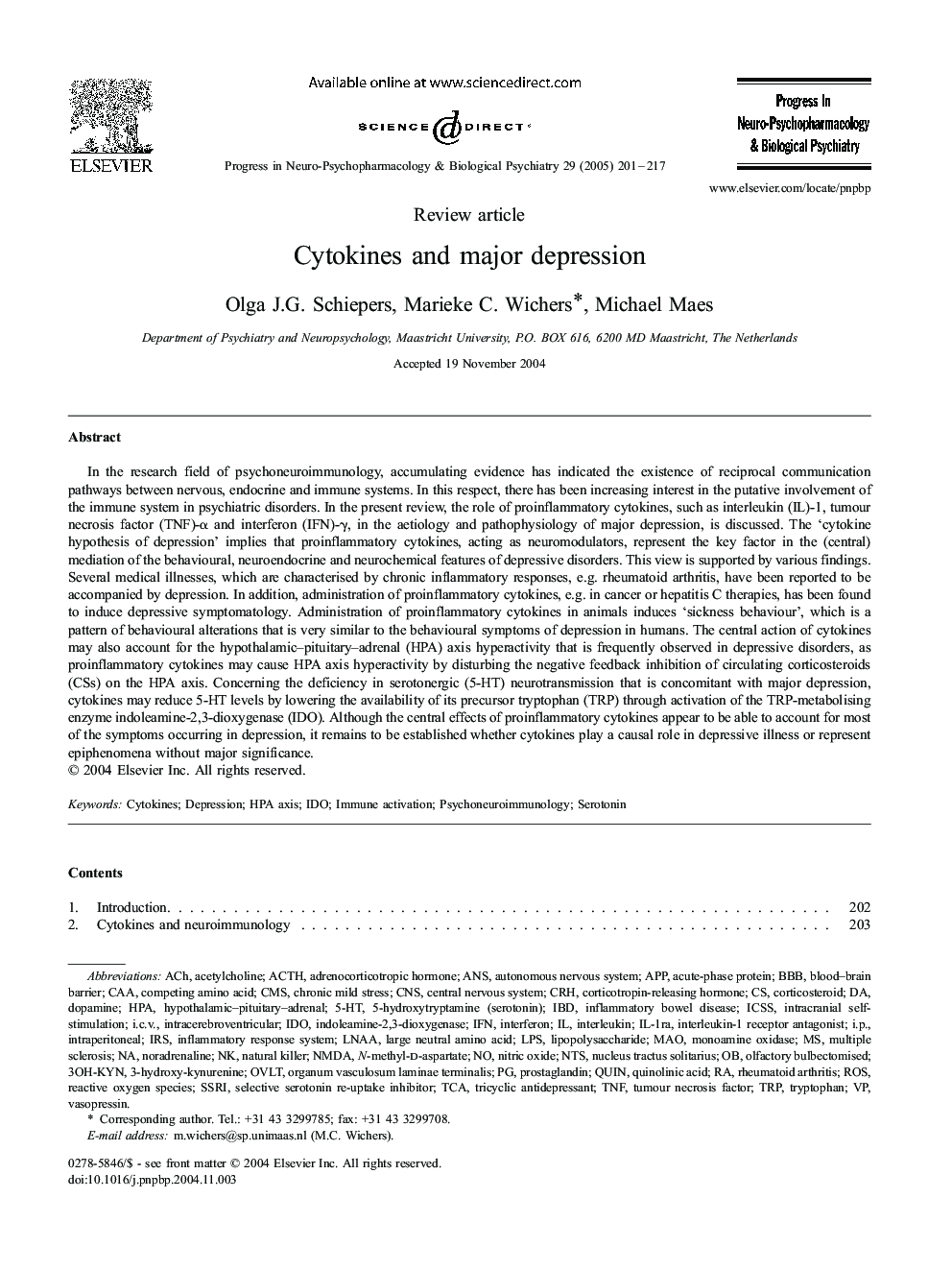| کد مقاله | کد نشریه | سال انتشار | مقاله انگلیسی | نسخه تمام متن |
|---|---|---|---|---|
| 9016451 | 1128098 | 2005 | 17 صفحه PDF | دانلود رایگان |
عنوان انگلیسی مقاله ISI
Cytokines and major depression
دانلود مقاله + سفارش ترجمه
دانلود مقاله ISI انگلیسی
رایگان برای ایرانیان
کلمات کلیدی
CMSIRSi.p.IBDAPPintracerebroventricularNMDAN-methyl-d-aspartatei.c.v.ICSSNTSTCACAACRHMAOTrpIL-1RAOVLTLPSIDOQUINLNAA5-HTACTHTNFnatural killer - (سلول های) کشنده طبیعی5-hydroxytryptamine (serotonin) - 5-hydroxytryptamine (سروتونین)organum vasculosum laminae terminalis - orgum vasculosum laminae terminalisROS - ROSRheumatoid arthritis - آرتریتروماتوئیدinterleukin-1 receptor antagonist - آنتاگونیست گیرنده اینترلوکین-1ACh - آهchronic mild stress - استرس مزمن مزمنAcetylcholine - استیل کولینLarge neutral amino acid - اسید آمینه خنثی بزرگQuinolinic acid - اسید کینولینیکDepression - افسردگیinterferon - اینترفرونIFN - اینترفرون هاinterleukin - اینترلوکینindoleamine-2,3-dioxygenase - ایندولامین-2،3-دیوکسژیگنازselective serotonin re-uptake inhibitor - بازدارنده جذب دوباره سروتونین انتخابیInflammatory bowel disease - بیماریهای التهابی رودهTryptophan - تریپتوفانIntracranial self-stimulation - خود تحریک داخل قلبintraperitoneal - داخل صفاقیTricyclic antidepressant - داروهای ضدافسردگی سه حلقه ایCNS - دستگاه عصبی مرکزیDopamine - دوپامینPsychoneuroimmunology - روان یونومونولوژیANS - سالBBB - سد خونی مغزیBlood–brain barrier - سد خونی مغزیSerotonin - سروتونینCytokines - سیتوکین هاcentral nervous system - سیستم عصبی مرکزیAutonomous nervous system - سیستم عصبی مستقلtumour necrosis factor - عامل نکروز تومورImmune activation - فعال سازی ایمنیlipopolysaccharide - لیپوپلی ساکاریدHPA axis - محور هیپوتالاموس-هیپوفیز-آدرنالSSRI - مهارکنندههای بازجذب سروتونینMultiple sclerosis - مولتیپل اسکلروزیس(ام اس)monoamine oxidase - مونوآمین اکسیدازها HPA - میلی بار یا هکتوپاسکالnoradrenaline - نورآدرنالین Nitric oxide - نیتریک اکسیدnucleus tractus solitarius - هسته دستگاه انفرادیadrenocorticotropic hormone - هورمون adrenocorticotropiccorticotropin-releasing hormone - هورمون آزاد کننده کورتیکوتروپینhypothalamic–pituitary–adrenal - هیپوتالاموس-هیپوفیز-آدرنالvasopressin - وازوپرسینAcute-phase protein - پروتئین حاد فازprostaglandin - پروستاگلاندینهاCorticosteroid - کورتیکواستروئیدها Reactive oxygen species - گونههای فعال اکسیژن
موضوعات مرتبط
علوم زیستی و بیوفناوری
علم عصب شناسی
روانپزشکی بیولوژیکی
پیش نمایش صفحه اول مقاله

چکیده انگلیسی
In the research field of psychoneuroimmunology, accumulating evidence has indicated the existence of reciprocal communication pathways between nervous, endocrine and immune systems. In this respect, there has been increasing interest in the putative involvement of the immune system in psychiatric disorders. In the present review, the role of proinflammatory cytokines, such as interleukin (IL)-1, tumour necrosis factor (TNF)-α and interferon (IFN)-γ, in the aetiology and pathophysiology of major depression, is discussed. The 'cytokine hypothesis of depression' implies that proinflammatory cytokines, acting as neuromodulators, represent the key factor in the (central) mediation of the behavioural, neuroendocrine and neurochemical features of depressive disorders. This view is supported by various findings. Several medical illnesses, which are characterised by chronic inflammatory responses, e.g. rheumatoid arthritis, have been reported to be accompanied by depression. In addition, administration of proinflammatory cytokines, e.g. in cancer or hepatitis C therapies, has been found to induce depressive symptomatology. Administration of proinflammatory cytokines in animals induces 'sickness behaviour', which is a pattern of behavioural alterations that is very similar to the behavioural symptoms of depression in humans. The central action of cytokines may also account for the hypothalamic-pituitary-adrenal (HPA) axis hyperactivity that is frequently observed in depressive disorders, as proinflammatory cytokines may cause HPA axis hyperactivity by disturbing the negative feedback inhibition of circulating corticosteroids (CSs) on the HPA axis. Concerning the deficiency in serotonergic (5-HT) neurotransmission that is concomitant with major depression, cytokines may reduce 5-HT levels by lowering the availability of its precursor tryptophan (TRP) through activation of the TRP-metabolising enzyme indoleamine-2,3-dioxygenase (IDO). Although the central effects of proinflammatory cytokines appear to be able to account for most of the symptoms occurring in depression, it remains to be established whether cytokines play a causal role in depressive illness or represent epiphenomena without major significance.
ناشر
Database: Elsevier - ScienceDirect (ساینس دایرکت)
Journal: Progress in Neuro-Psychopharmacology and Biological Psychiatry - Volume 29, Issue 2, February 2005, Pages 201-217
Journal: Progress in Neuro-Psychopharmacology and Biological Psychiatry - Volume 29, Issue 2, February 2005, Pages 201-217
نویسندگان
Olga J.G. Schiepers, Marieke C. Wichers, Michael Maes,